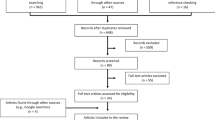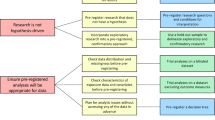Abstract
The issue considered in this study is whether there is misreporting in official data on disability status. While there is a rather large literature on misreporting of self-assessed disability, evidence regarding register data is scant. It seems to be a widely held view among researchers that, since individuals out of work are inclined to respond towards poor health, it would be best to have official data provided by the relevant administrative bodies. But we argue that such administrative data should be regarded with some suspicion, since the administrators also may have incentives to misreport. The empirical evidence, based on a large sample of Swedish jobseekers, suggests systematic misreporting by the Public Employment Service of official disability measures due to incentives to misreport disability.
Similar content being viewed by others
References
Aarts LJ, de Jong PR (1992) Economic aspects of disability behavior. Elsevier, Amsterdam
Ams (1999) Handikappkunskap. Arbetsmarknadsverkets utbildningsmaterial 1999-06-01. National Labour Market Board, Stockholm
Baker M, Stabile M, Deri C (2004) What do self-reported, objective, measures of health measure?. J Hum Resour 39: 1067–1093
Benitez-Silva H, Chan H, Rust J, Sheidvasser S (1999) An empirical analysis of the Social Security disability application, appeal and award process. Labour Econ 6: 147–178
Benitez-Silva H, Buchinsky M, Rust J (2003) How large are the classification errors in the Social Security disability award process?. Working paper, University of Maryland, College Park
Benitez-Silva H, Buchinsky M, Chan HM, Cheidvasser S, Rust J (2004) How large is the bias in self-reported disability?. J Appl Econom 19: 649–670
Bergeskog A (2001) Labour market policies, strategies and statistics for people with disabilities. A cross-national comparison. Working paper 2001:13, Office of Labour Market Policy Evaluation, Uppsala
Björklund A (1985) Unemployment and mental health: some evidence from panel data. J Hum Resour 20: 469–483
Bound J (1991) Self-reported versus objective measures of health in retirement models. J Hum Resour 26: 106–138
Bound J, Brown C, Mathiowetz N (2001) Measurement error in survey data. In: Heckman JJ, Leamer E (eds) Handbook of econometrics, vol 5. Handbooks in economics 2. Elsevier, Amsterdam, pp 3705–3843
Cullen JB (2003) The impact of fiscal incentives on student disability rates. J Public Econ 87: 1557– 1589
de Jong P, Lindeboom M (2004) Privatization of sickness insurance: evidence from the Netherlands. Swed Econ Policy Rev 11: 121–143
Federal Ministry of Economics and Labour (2003) Economic Report. Bridges to the Labor Market, Berlin
Fitzenberger B, Osikominu A, Völter R (2006) Imputation rules to improve the education variable in the IAB employment subsample. Schmollers Jahrb Z Wirtsch- und Sozialwiss/J Appl Soc Sci Stud 126: 405–436
Gerdtham U-G, Johannesson M (2003) A note on the effect of unemployment on mortality. J Health Econ 22: 505–518
Gruber J, Kubik JD (1997) Disability insurance rejection rates and the labor supply of older workers. J Public Econ 64: 1–23
Haavisto T, Höjgård S, Vlachos V (1993) Arbete åt arbetshandikappade. En samhällsekonomisk utvärdering av Samhall. Reports from Växjö University, Ser. 1 Economy and Politics 36
Hamilton VH, Merrigan P, Dufresne E (1997) Down and out: estimating the relationship between mental health and unemployment. Health Econ 6: 397–407
Hastie TJ, Tibshirani RJ (1990) Generalized additive models. Chapman & Hall, London
Haveman RH, Halberstadt V, Burkhauser RV (eds) (1984) Public policy toward disabled workers. Cornell University Press, Ithaca
Heckman JJ, Lalonde RJ, Smith JA (1999) The economics and econometrics of active labor market programs. In: Ashenfelter O, Card D (eds) Handbook of labor economics, vol 3 A. Elsevier, Amsterdam, pp 1865–2097
Johansson P, Palme M (2005) Moral hazard and sickness insurance. J Public Econ 89: 1879–1890
Johansson P, Skedinger P (2005) Are objective, official measures of disability reliable? Working paper 2005:14, Institute for Labour Market Policy Evaluation, Uppsala
Kapteyn A, Ypma JY (2007) Measurement error and misclassification. A comparison of survey and register data. J Labor Econ 25: 513–551
Kerkhofs M, Lindeboom M (1995) Age related health dynamics and changes in labour market status. Health Econ 6: 407–423
Kerkhofs M, Lindeboom M, Theeuwes J (1999) Retirement, financial incentives and health. Labour Econ 6: 203–227
Kreider B (1999) Latent work disability and reporting bias. J Hum Resour 34: 734–769
Kreider B, Pepper JV (2007) Disability and employment: reevaluating the evidence in light of reporting errors. J Am Stat Assoc 102: 432–441
Kreider B, Pepper J (2008) Inferring disability from corrupt data. J Appl Econom 23: 329–349
Larsson L (2004) Harmonizing unemployment and sickness insurance: Why(not)?. Swed Econ Policy Rev 11: 121–143
Lindeboom M, Kerkhofs M (2003) Health and the work of the elderly. Working paper, Free University of Amsterdam
Neyman J (1990) On the application of probability theory to agricultural experiments. Essay on principles. Stat Sci 5: 465–472
Nyberg S, Skedinger P (1998) Arbetsförmedlingarna–mål och drivkrafter. Ds 1998:16. Expertgruppen för studier i offentlig ekonomi, Ministry of Finance, Stockholm
Rubin DB (1973a) Matching to remove bias in observational studies. Biometrics 29: 159–183
Rubin DB (1973b) The use of matched sampling and regression adjustments to remove bias in observational studies. Biometrics 29: 185–203
Ruhm CJ (2000) Are recessions good for your health?. Q J Econ 115: 617–650
Ruhm CJ (2003) Good times make you sick. J Health Econ 22: 637–658
Skedinger P, Widerstedt B (2007) Cream skimming in employment programmes for the disabled? Evidence from Sweden. Int J Manpow 28: 694–714
SOU (2003:95) Arbetskraft. Ministry for Industry, Employment and Communication, Stockholm
Zetterberg J (1997) Halverad öppen arbetslöshet–politisk retorik eller adekvat målformulering? In: Tretton inlägg om arbetslöshet, AER-rapport 2, Stockholm
Author information
Authors and Affiliations
Corresponding author
Rights and permissions
About this article
Cite this article
Johansson, P., Skedinger, P. Misreporting in register data on disability status: evidence from the Swedish Public Employment Service. Empir Econ 37, 411–434 (2009). https://doi.org/10.1007/s00181-008-0238-6
Received:
Accepted:
Published:
Issue Date:
DOI: https://doi.org/10.1007/s00181-008-0238-6




